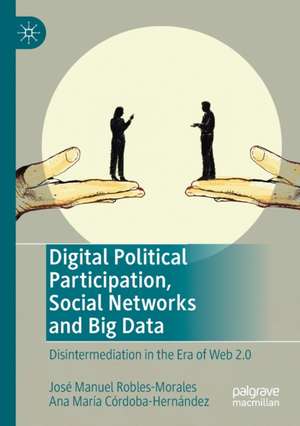Digital Political Participation, Social Networks and Big Data: Disintermediation in the Era of Web 2.0
Autor José Manuel Robles-Morales, Ana María Córdoba-Hernándezen Limba Engleză Paperback – oct 2020
| Toate formatele și edițiile | Preț | Express |
|---|---|---|
| Paperback (1) | 379.86 lei 6-8 săpt. | |
| Springer International Publishing – oct 2020 | 379.86 lei 6-8 săpt. | |
| Hardback (1) | 468.57 lei 6-8 săpt. | |
| Springer International Publishing – oct 2019 | 468.57 lei 6-8 săpt. |
Preț: 379.86 lei
Nou
Puncte Express: 570
Preț estimativ în valută:
72.69€ • 75.10$ • 60.47£
72.69€ • 75.10$ • 60.47£
Carte tipărită la comandă
Livrare economică 19 martie-02 aprilie
Preluare comenzi: 021 569.72.76
Specificații
ISBN-13: 9783030277598
ISBN-10: 3030277593
Pagini: 151
Ilustrații: XI, 151 p. 10 illus., 1 illus. in color.
Dimensiuni: 148 x 210 mm
Greutate: 0.22 kg
Ediția:1st ed. 2019
Editura: Springer International Publishing
Colecția Palgrave Macmillan
Locul publicării:Cham, Switzerland
ISBN-10: 3030277593
Pagini: 151
Ilustrații: XI, 151 p. 10 illus., 1 illus. in color.
Dimensiuni: 148 x 210 mm
Greutate: 0.22 kg
Ediția:1st ed. 2019
Editura: Springer International Publishing
Colecția Palgrave Macmillan
Locul publicării:Cham, Switzerland
Cuprins
Chapter 1. Introduction.- PART I. THE FRAMEWORK: TOWARDS A DISINTERMEDIATED POLITICS?.- Chapter 2. The mediated public opinion: When everything happens through others.- Chapter 3. The culture of politics on the Network.- Chapter 4. The political potential of social networks.- Chapter 5. The dreams of technological reason generate monsters.- PART II. DISINTERMEDIATION IN SOCIAL NETWORKS.- Chapter 6. The disintermediation of the agents, the case of #UnidosPodemos.- Chapter 7. The disintermediation of the message: the case of #BlackLivesMatter.- Chapter 8. The disintermediation of the space: the case of #BringBackOurGirls.- Chapter 9. How does politics work? The Big Data view.- Chapter 10. Conclusions.
Notă biografică
José Manuel Robles-Morales is a lecturer at the Sociology III Department at Complutense University, Spain. His research focuses on digital political participation, digital political theory, and technological differences (digital divide). His publications have appeared in journals such as Information Communication and Society, The European Journal of Communication Research, Revista Internacional de Sociología and Revista Española de Investigaciones Sociológicas.
Ana María Córdoba-Hernández is Research and Faculty Head at the Faculty of Communication at the University of La Sabana, Colombia. Her research focuses on media, specifically in the context of international communication, digital political participation, the transformation of the network society and the analysis of socio-political phenomena across social networks.
Ana María Córdoba-Hernández is Research and Faculty Head at the Faculty of Communication at the University of La Sabana, Colombia. Her research focuses on media, specifically in the context of international communication, digital political participation, the transformation of the network society and the analysis of socio-political phenomena across social networks.
Textul de pe ultima copertă
This book explores the changes in political communication in light of the development of a public opinion mediated by web 2.0 technologies. One of the most important changes in political communication is related to the process of disintermediation, i.e. the process by which digital technologies allow citizens to compete in the public space with those agents who, traditionally, co-opted public opinion. However, while disintermediation has undeniably generated a number of advances, having linked citizens to the public debate, the authors highlight some aspects where disintermediation is moving away from a rational and inclusive public space. They argue that these aspects, related to the immediacy, polarization and incivility of the communication, obscure the possibilities for democratization of digital political communication.
José Manuel Robles-Morales is a lecturer at the Sociology III Department at Complutense University, Spain. His research focuses on digital political participation, digital political theory, and technological differences (digital divide). His publications have appeared in journals such as Information Communication and Society, The European Journal of Communication Research, Revista Internacional de Sociología and Revista Española de Investigaciones Sociológicas.
Ana María Córdoba-Hernández is Research and Faculty Head at the Faculty of Communication at the University of La Sabana, Colombia. Her research focuses on media, specifically in the context of international communication, digital political participation, the transformation of the network society and the analysis of socio-political phenomena across social networks.
Caracteristici
Explores how digital media intersect conventional and non-conventional political participation dynamics Analyses the extent to which Web 2.0 is strengthening the political role played by citizens Presents case studies of disintermediation within conventional and non-conventional political participation contexts
